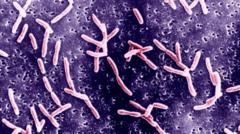In recent weeks, the city of Pune, located in western India, has been rocked by a troubling outbreak of Guillain-Barré Syndrome (GBS), a rare and severe neurological disorder. This health crisis has resulted in approximately 160 reported cases, with five confirmed deaths attributed to the illness since early January. Medical professionals are now assessing the cause and impact to curb further outbreaks.
The symptoms of GBS can begin subtly, as seen in a case involving a six-year-old boy who initially struggled to hold his pencil and was later found to require intensive medical intervention. Within a short time frame, he was unable to move his limbs and relied on ventilator support for breathing. Fortunately, he is now on the path to recovery. GBS manifests with symptoms starting from tingling and numbness in the extremities, escalating into significant muscle weakness and paralysis.
Health officials suspect that the spike in GBS cases in Pune is linked to campylobacter jejuni, a common bacterial pathogen responsible for foodborne illnesses. This strain has correlations with GBS outbreaks globally, particularly in regions where contaminated water or undercooked poultry is a significant risk factor. Investigations reveal a similar outbreak reported in Peru earlier this year, leading authorities to declare a national health emergency there.
Notably, while GBS can occur due to various triggers, evidence suggests that strain variability among campylobacter bacteria can result in a rare but severe immune response known as molecular mimicry, which leads the body’s immune system to mistakenly attack nerve cells. Medical professionals are particularly vigilant in Pune as they explore the presence of at-risk strains of campylobacter that could be linked to the current outbreak.
Given the complexities of diagnosing GBS, which shares symptoms with other neurological disorders, doctors are working alongside public health teams from the World Health Organization to ensure accurate identification and treatment of cases. Meanwhile, Pune's municipal health department has been active in monitoring local water supplies, educating residents on food safety, and encouraging practices such as boiling water and avoiding unprocessed food items.
The situation in Pune emphasizes the need for awareness and swift public health action, as health officials continue to trace the origins of the outbreak and encourage preventive measures among the population. Despite these efforts, uncertainties remain regarding the exact cause of the infections, leaving many residents on edge.




















